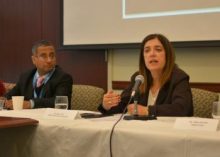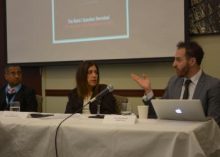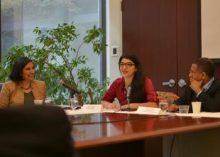The situation of Iranian Baha’is should be given more attention in overall discussions of human rights in Iran, said experts this week at the launch of a new report on the persecution Baha’is in Iran.
The report, “The Baha’i Question Revisited: Persecution and Resilience in Iran” was formally released at the event, held Tuesday, 25 October 2016, in the offices of the Baha’i International Community, which authored the report.
Four individuals joined in a conversation at the launch: Ahmed Shaheed, the UN’s Special Rapporteur on human rights in Iran; Mani Mostofi, director, Impact Iran; Diane Ala’i, a representative of the Baha’i International Community to the UN in Geneva, and Nika Saeedi, a graduate of the Baha’i Institute for Higher Education (BIHE).
The panelists said the new BIC report was timely and important, inasmuch as it sheds light on the situation of Iranian Baha’is, which they said can be seen as a bellwether for human rights generally in Iran.
Dr. Shaheed opened the discussion, saying that too often the situation of Iranian Baha’is is “swamped in the larger noise that’s out there about everything that is going wrong in Iran.”
“If you look at my own reports, for example, the death penalty and other issues have been the focus,” he said. “So the Baha’i question doesn’t get the attention it deserves. It requires a higher profile and attention.”
This is so, he said, because if “a state is unwilling to accept at the bottom line equal rights for all its citizens, we will never get to other issues.”
In that light, said Dr. Shaheed, “Iran should get a clear message that when it comes to cases of religious discrimination, there is no other place to go on this. They cannot cite any argument to deny equality to all their citizens.”
Mr. Mostofi agreed with Dr. Shaheed’s assessment of the importance of treating the Baha’i question as an overall indicator of the state of human rights in Iran.
“Once the Baha’is get all their rights in Iran, that will pretty much mean that every other citizen has them too,” said Mr. Mostofi.
He said this has been recognized in recent years by human rights activists inside and outside Iran.
For many years, he said, Iranian civil society shunned taking up the cause for “Baha’i rights,” because Baha’is had been so “other-ized.”
“If you just called somebody a Baha’i, that was a slur,” he said. “You didn’t have to explain it.”
But more recently, he said, there is “more and more vocal support for Baha’i rights.” This support has come not only from human rights activists but also journalists and even clerics.
It is partly for that reason, he said, that the government has stepped up its campaign of anti-Baha’i propaganda in the news media, which, according to the new report, has seen some 20,000 items published or broadcast over the least three years.
“The anti-Baha’i defamation campaign is designed to counter the awakening of Iranian civil society in the field of human rights,” said Mr. Mostofi.
Ms. Ala’i addressed the substance of the anti-Baha’i propaganda campaign, saying that Iran has been very good at tapping into what feeds religious hatred.
“For example, in one particular strata of society, which is very conservative, very religious, where chastity is important and wearing the veil is very important, they will spread such lies that the Baha’is are decadent, that sister and brother can get married with one another, or other things like that, which are of course total lies,” said Ms. Ala’i.
To another stratum of society, she said, one that is prone to believe in conspiracy theories, the government will promote “the claims and lies that the Baha’i Faith is not a religion but was something created by the British to undermine Iran.”
More recently, she said, the government has promoted the idea that the Baha’is are spies for Israel – a falsehood that can be easily deconstructed.
“First, how can you have a whole community be spies,” she asked. “How can you have spies from one generation to another, mothers, grandfathers, and children?”
The fabrication stems, she said, from the fact that Baha’u’llah, the Prophet-Founder of the Faith, was exiled by 19th century Iranian and Ottoman rulers to what was then Palestine, well before the state of Israel was established.
Ms. Saeedi, who is now a policy specialist in gender, political processes and peace building, described the discrimination she faced as a young Baha’i growing up in Iran – and how the denial of access to education led her to attend and ultimately graduate from the , which was established by the Baha’i community in the late 1980s to provide higher education for young Baha’is in Iran.
As a young girl in primary and secondary school, she said, teachers called her an “untouchable.” And she was forced to move often from school to school to avoid such prejudice.
“For one year, they put me in the corner of the class and told me not to touch anyone and not to talk to anyone,” she said. “That was the condition they accepted me on, in being in class.”
Eventually, denied access to university, she turned to the BIHE for university-level learning.
Despite all of this, she said, she did not hate her persecutors.
“My parents never told me, ‘Oh, they are the bad guys,’” she said. “My parents and community always reminded me of the beauty of humanity, that the essence of religion is peace and love and unity.”
The full “Baha’i Question Revisited” report can be read here.
A video recording of the entire discussion can be viewed here.



Leave a Reply